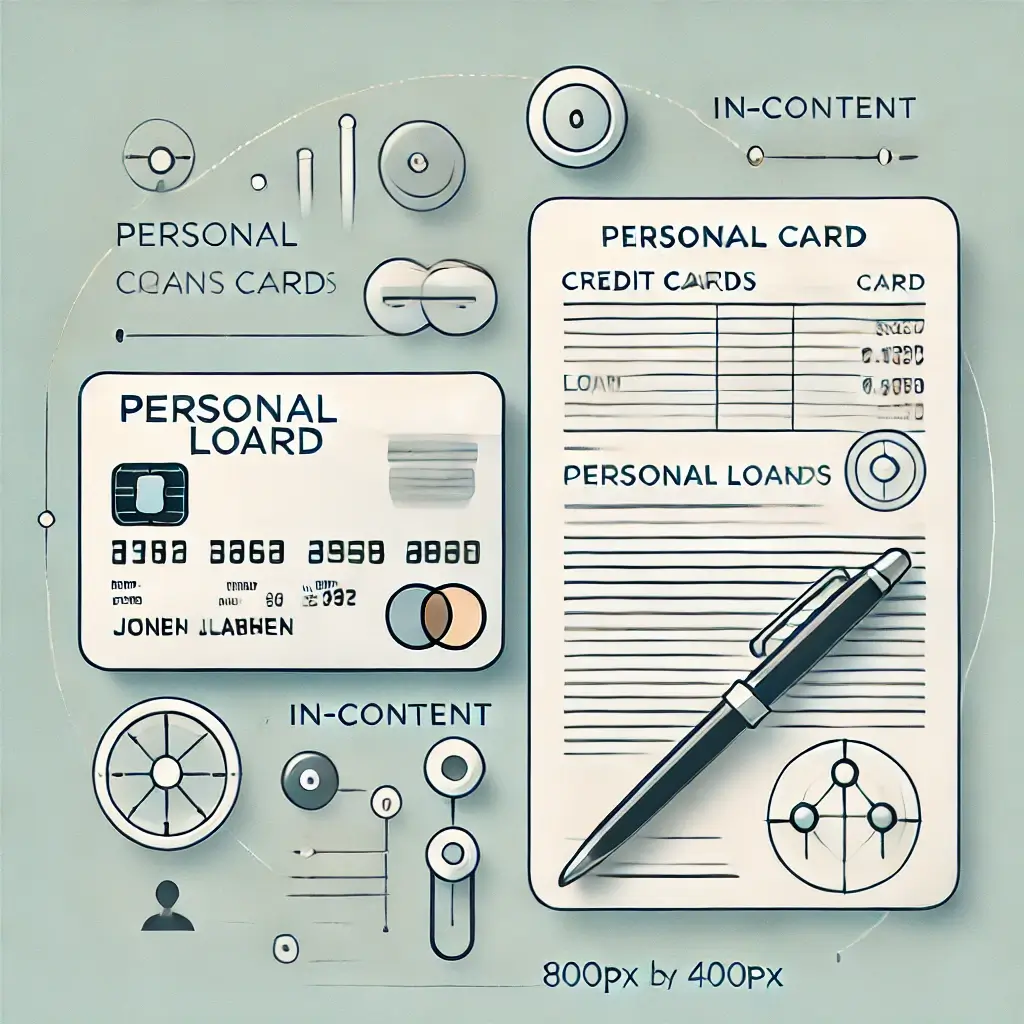In today’s financial landscape, consumers have access to numerous borrowing options. Among the most popular are personal loans and credit cards. These financial tools offer distinct features, and understanding their differences is key to making the best choice for your needs. Personal loans provide a lump sum for specific uses, such as debt consolidation, home improvements, or unexpected expenses, typically at a fixed interest rate over a set repayment term.
On the other hand, credit cards offer a revolving line of credit, suitable for everyday purchases, with the flexibility of partial payments. They can be convenient but may lead to debt accumulation if not managed carefully. Each option has advantages and potential pitfalls. Let’s explore the characteristics of personal loans and credit cards to help you make an informed decision.
Understanding Personal Loans
Personal loans are a type of installment credit offered by banks, credit unions, and online lenders. They are available as secured or unsecured loans. Secured loans require collateral, such as a vehicle or property, reducing risk to the lender, which can result in lower interest rates. Unsecured loans do not require collateral, making them more accessible but often at a higher interest rate.
Application Process:
To apply for a personal loan, borrowers must verify their income and provide personal identification. A credit check is standard, and some lenders may request additional documents. Loan amounts typically range from a few thousand to tens of thousands of dollars, with repayment terms spanning from two to seven years. The interest rate depends on the borrower’s credit score and financial history.
When Personal Loans Are Useful:
Personal loans are ideal for debt consolidation, major expenses, and emergencies. They offer predictable monthly payments, making it easier to budget. Borrowers can use them for various needs, such as financing weddings, medical expenses, or home improvements.
Understanding Credit Cards
Credit cards provide a revolving line of credit, meaning you can borrow up to a limit, repay, and borrow again as needed. This flexibility makes them popular for everyday purchases. Credit cards vary widely, from rewards cards offering cashback or travel points to low-interest cards designed for carrying a balance more affordably.
Application Process:
Credit card applications require personal information, including income and employment details. A credit check determines eligibility and assigns a credit limit. Billing cycles typically last a month, and cardholders receive statements detailing their spending and total balance due.
When Credit Cards Are Useful:
Credit cards are suitable for everyday expenses, unexpected purchases, or for managing monthly cash flow. Rewards cards offer benefits like points and cashback, making them attractive for routine spending.
Key Differences Between Personal Loans and Credit Cards
Here are some essential distinctions between personal loans and credit cards:
- Repayment Structure:
Personal loans have structured repayment schedules with monthly installments covering both principal and interest, helping with budgeting. In contrast, credit cards allow for minimal payments but accrue interest on outstanding balances, potentially increasing costs over time. - Interest Rates:
Personal loans generally have lower interest rates than credit cards, especially for borrowers with strong credit. Credit cards often have high interest rates, particularly for those who carry balances. - Flexibility:
Personal loans provide a lump sum for one-time expenses, making them ideal for planned purchases. Credit cards, with their revolving credit, are better for ongoing, small purchases or unexpected expenses but require careful management to avoid debt.
Each option serves specific financial needs. Choosing between them requires careful assessment of these key differences.
Pros and Cons of Personal Loans
Pros of Personal Loans:
- Fixed Interest Rates:
Personal loans usually have fixed rates, making it easier to budget over the life of the loan. - Predictable Payments:
With set monthly payments, borrowers have financial consistency, reducing the risk of unplanned expenses. - Versatile Use:
Personal loans can fund debt consolidation, major purchases, and emergencies.
Cons of Personal Loans:
- Fees:
Some personal loans carry fees, such as origination fees or prepayment penalties, increasing costs. - Credit Impact:
Multiple loan applications in a short period may lead to hard inquiries, temporarily affecting credit scores.
While personal loans offer stability and predictability, borrowers should weigh these benefits against potential fees and credit implications.
Pros and Cons of Credit Cards
Pros of Credit Cards:
- Rewards Programs:
Many credit cards offer cashback, points, or travel rewards, potentially saving money on regular purchases. - Flexibility:
Credit cards allow users to pay only the minimum balance each month, though it’s best to pay in full to avoid interest charges. - Credit Building:
Timely credit card payments contribute to a good credit score, which is valuable for future borrowing.
Cons of Credit Cards:
- High-Interest Rates:
Interest rates on credit cards can be high, making them costly for users who carry a balance. - Debt Accumulation Risk:
The revolving nature of credit cards can lead to debt buildup if spending isn’t monitored.
Credit cards offer convenience and rewards but require disciplined usage to avoid debt and high interest costs.

Here’s a table summarizing the comparison between Personal Loans and Credit Cards:
| Feature | Personal Loans | Credit Cards |
|---|---|---|
| Type of Credit | Lump sum loan | Revolving line of credit |
| Repayment Structure | Fixed monthly installments | Flexible minimum payments with revolving balance |
| Interest Rate | Typically lower and fixed (especially for good credit) | Generally higher and often variable |
| Purpose | Ideal for debt consolidation, large purchases, or emergencies | Best for everyday purchases, short-term expenses, or rewards |
| Application Process | Requires income verification, credit check, and sometimes collateral (for secured loans) | Requires credit check and basic personal information |
| Payment Flexibility | Fixed repayment schedule | Flexible payments but can accumulate debt if only minimum is paid |
| Fees | Possible origination fees or prepayment penalties | Possible annual fees, late fees, and high-interest charges on carried balances |
| Credit Score Impact | Positive if paid on time; missed payments impact score | Positive if used responsibly; missed payments or high utilization can lower credit score |
| Pros | Predictable payments, lower interest rates, versatile use | Rewards and cashback, flexibility in payments, builds credit if managed well |
| Cons | Fixed payment amount, potential fees, can impact credit if multiple loans are taken | High-interest rates, risk of overspending, revolving debt can quickly accumulate |
| Best For | Debt consolidation, large purchases, planned expenses | Everyday purchases, short-term borrowing, rewards and perks for frequent spending |
When to Choose a Personal Loan
Personal loans are advantageous in certain scenarios:
- Debt Consolidation:
Personal loans are beneficial for consolidating high-interest debts, simplifying payments, and potentially reducing overall interest. - Large Purchases:
For home improvements, weddings, or major expenses, personal loans provide fixed terms and rates, making budgeting easier. - Emergencies:
When urgent funds are needed, personal loans offer access to cash at more favorable rates than credit cards, without revolving debt.
Personal loans suit those looking for stable repayment schedules and predictable terms, especially when facing large expenses.
When to Choose a Credit Card
Credit cards are effective for specific situations:
- Everyday Purchases:
Using credit cards for daily expenses like groceries or gas allows users to earn rewards and track spending. - Short-Term Cash Flow Management:
Credit cards offer a buffer for fluctuating monthly expenses, provided balances are paid in full each cycle. - Earning Rewards:
Reward credit cards can turn regular expenses into valuable points or cash back for frequent travelers or shoppers.
Credit cards are suitable for routine spending or short-term borrowing but should be used with caution to avoid interest and debt.
Conclusion: Making the Right Choice for Your Financial Situation
When deciding between personal loans and credit cards, consider your financial goals, borrowing needs, and repayment capabilities. With their lower interest rates and predictable payments, personal loans are ideal for larger, one-time expenses like debt consolidation or planned purchases. Credit cards, however, offer flexible credit for everyday purchases and short-term financing needs.
Evaluate your financial situation, and seek advice from financial professionals to make the best choice. By understanding the differences between personal loans and credit cards, you can select the option that aligns with your financial goals and supports long-term stability.
